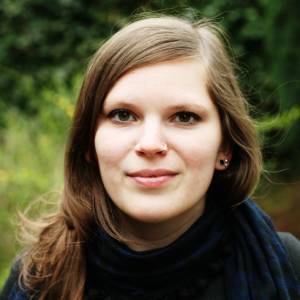Julia Eckel (Germany)
1 – Ruhr-University Bochum
Julia Eckel
Julia Eckel is a postdoctoral research assistant at the Institute for Media Studies at Ruhr-University Bochum and research coordinator of the university’s DFG Research Training Group “Documentary Practices. Excess and Privation”. Together with Erwin Feyersinger, she is speaker of the working group AG Animation. Research interests: (documentary) animation, anthropocentrisms of media theory, selfies, and the temporality of audiovisual media. Publications include: Exploring the Selfie – Historical, Theoretical, and Analytical Approaches to Digital Self Photography (2018; ed. with J. Ruchatz & S. Wirth); Ästhetik des Gemachten. Interdisziplinäre Beiträge zur Animations- und Comicforschung (2018; ed. with H.-J. Backe, E. Feyersinger, V. Sina & J.-N. Thon); Im Wandel … Metamorphosen der Animation (2017; ed. with E. Feyersinger & M. Uhrig) and (Dis)Orienting Media and Narrative Mazes (2013; ed. with B. Leiendecker, D. Olek & C. Piepiorka). For more details visit: www.juliaeckel.de
Abstract
In my talk I would like to focus on the triangular nexus of animation, documentation, and space. Considering recent writings about animated documentaries and documentary animation, there seems to be a predominant focus on film and the question of how animated movies can provide images that meet the ‘standards’ of documentation in delivering truths about real world events. In these respects, animation serves as a mimetic substitute for or non-mimetic commentary to these real world events or as a tool to visualize or evoke otherwise non-conceivable phenomena, as Annabelle Honess Roe (2013) points out. In my presentation, I would like to take these categories as a backdrop to focus on two examples which, first, might (or might not) exceed these ideas of a substitutive animation, second, are not ‘film’ (in a strict sense), and third, suggest to connect the question of documentary animation with questions of space: One example comes from the field of art/installation (Forensic Architecture) and the other is a phenomenon within computer game culture (in-game cinematography/photography). By relating these examples of spatial/animated/documenting materials with de Certeaus differentiation of “space” and “place”, my talk aims at deepening questions of animation based documentary practices and their interconnectedness with real sites and virtual settings – or, in short, documented places and animated spaces.
Palavras-chave: animated documentary, space, place, forensic animation, computer games
